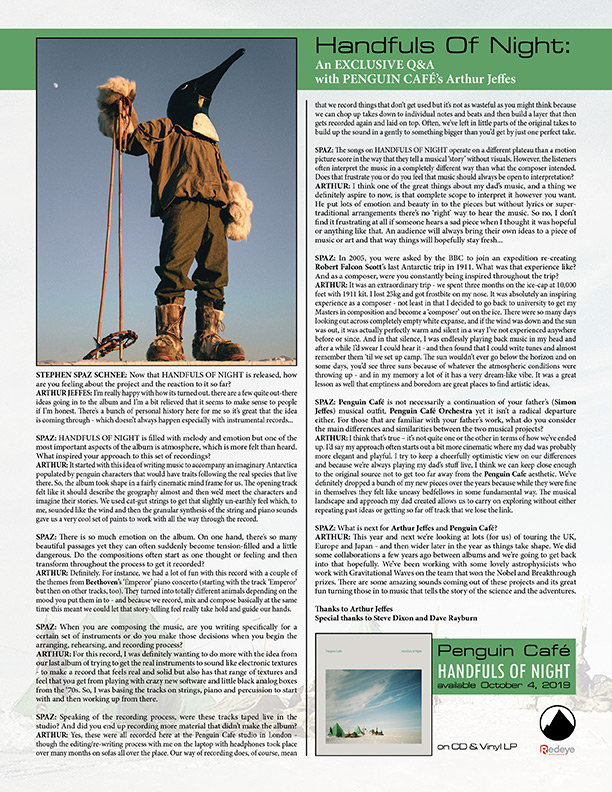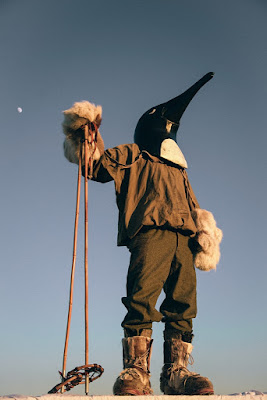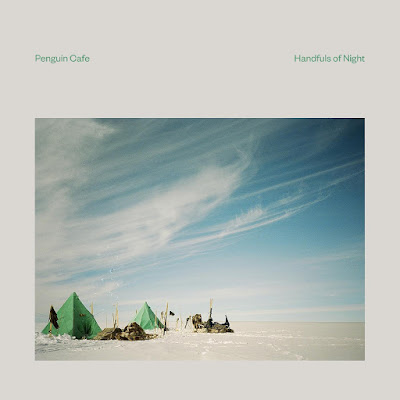STEPHEN SPAZ SCHNEE: Now that HANDFULS OF NIGHT is released, how
are you feeling about the project and the reaction to it so far?
ARTHUR JEFFES: I’m really happy with how its turned out. there are
a few quite out-there ideas going in to the album and I’m a bit relieved that
it seems to make sense to people if I’m honest. There’s a bunch of personal
history here for me so it’s great that the idea is coming through – which
doesn’t always happen especially with instrumental records…
SPAZ: HANDFULS OF NIGHT is filled with melody and emotion but one of
the most important aspects of the album is atmosphere, which is more felt than
heard. What inspired your approach to this set of recordings?
ARTHUR: It started with this idea of writing music to accompany an
imaginary Antarctica populated by penguin characters that would have traits
following the real species that live there. So, the album took shape in a
fairly cinematic mind frame for us. The opening track felt like it should
describe the geography almost and then we’d meet the characters and imagine
their stories. We used cat-gut strings to get that slightly un-earthly feel
which, to me, sounded like the wind and then the granular synthesis of the
string and piano sounds gave us a very cool set of paints to work with all the
way through the record.
SPAZ: There is so much emotion on the album. On one hand, there’s
so many beautiful passages yet they can often suddenly become tension-filled
and a little dangerous. Do the compositions often start as one thought or
feeling and then transform throughout the process to get it recorded?
ARTHUR: Definitely. For instance, we had a lot of fun with this
record with a couple of the themes from Beethoven’s
‘Emperor’ piano concerto (starting with the track ‘Emperor’ but then on other
tracks, too). They turned into totally different animals depending on the mood
you put them in to – and because we record, mix and compose basically at the
same time this meant we could let that story-telling feel really take hold and
guide our hands.
SPAZ: When you are composing the music, are you writing
specifically for a certain set of instruments or do you make those decisions
when you begin the arranging, rehearsing, and recording process?
ARTHUR: For this record, I was definitely wanting to do more with
the idea from our last album of trying to get the real instruments to sound
like electronic textures – to make a record that feels real and solid but also
has that range of textures and feel that you get from playing with crazy new
software and little black analog boxes from the ‘70s. So, I was basing the
tracks on strings, piano and percussion to start with and then working up from
there.
SPAZ: Speaking of the recording process, were these tracks taped
live in the studio? And did you end up recording more material that didn’t make
the album?
ARTHUR: Yes, these were all recorded here at the Penguin Cafe
studio in London – though the editing/re-writing process with me on the laptop
with headphones took place over many months on sofas all over the place. Our
way of recording does, of course, mean that we record things that don’t get
used but it’s not as wasteful as you might think because we can chop up takes
down to individual notes and beats and then build a layer that then gets
recorded again and laid on top. Often, we’ve left in little parts of the
original takes to build up the sound in a gently to something bigger than you’d
get by just one perfect take.
SPAZ: The songs on HANDFULS OF NIGHT operate on a
different plateau than a motion picture score in the way that they tell a
musical ‘story’ without visuals. However, the listeners often interpret the
music in a completely different way than what the composer intended. Does that
frustrate you or do you feel that music should always be open to
interpretation?
ARTHUR: I think one of the great things about my dad’s music, and a
thing we definitely aspire to now, is that complete scope to interpret it
however you want. He put lots of emotion and beauty in to the pieces but
without lyrics or super-traditional arrangements there’s no ‘right’ way to hear
the music. So no, I don’t find it frustrating at all if someone hears a sad
piece when I thought it was hopeful or anything like that. An audience will
always bring their own ideas to a piece of music or art and that way things
will hopefully stay fresh…
SPAZ: In 2005, you were asked by the BBC to join an expedition
re-creating Robert Falcon Scott’s
last Antarctic trip in 1911. What was that experience like? And as a composer,
were you constantly being inspired throughout the trip?
ARTHUR: It was an extraordinary trip – we spent three months on the
ice-cap at 10,000 feet with 1911 kit. I lost 25kg and got frostbite on my nose.
It was absolutely an inspiring experience as a composer – not least in that I
decided to go back to university to get my Masters in composition and become a
‘composer’ out on the ice. There were so many days looking out across
completely empty white expanse, and if the wind was down and the sun was out,
it was actually perfectly warm and silent in a way I’ve not experienced
anywhere before or since. And in that silence, I was endlessly playing back music
in my head and after a while I’d swear I could hear it – and then found that I
could write tunes and almost remember them ‘til we set up camp. The sun
wouldn’t ever go below the horizon and on some days, you’d see three suns
because of whatever the atmospheric conditions were throwing up – and in my
memory a lot of it has a very dream-like vibe. It was a great lesson as well
that emptiness and boredom are great places to find artistic ideas.
SPAZ: Penguin Café is not necessarily a continuation of your father’s
(Simon Jeffes) musical outfit, Penguin Café Orchestra yet it isn’t a
radical departure either. For those that are familiar with your father’s work,
what do you consider the main differences and similarities between the two
musical projects?
ARTHUR: I think that’s true – it’s not quite one or the other in
terms of how we’ve ended up. I’d say my approach often starts out a bit more
cinematic where my dad was probably more elegant and playful. I try to keep a
cheerfully optimistic view on our differences and because we’re always playing
my dad’s stuff live, I think we can keep close enough to the original source
not to get too far away from the Penguin Cafe aesthetic. We’ve definitely
dropped a bunch of my new pieces over the years because while they were fine in
themselves they felt like uneasy bedfellows in some fundamental way. The
musical landscape and approach my dad created allows us to carry on exploring
without either repeating past ideas or getting so far off track that we lose
the link.
SPAZ: What is next for
Arthur Jeffes and Penguin Café?
ARTHUR: This year and next we’re looking at lots (for us) of
touring the UK, Europe and Japan – and then wider later in the year as things
take shape. We did some collaborations a few years ago between albums and we’re
going to get back into that hopefully. We’ve been working with some lovely
astrophysicists who work with Gravitational Waves on the team that won the
Nobel and Breakthrough prizes. There are some amazing sounds coming out of
these projects and its great fun turning those in to music that tells the story
of the science and the adventures.
SPAZ: What are you currently spinning on your CD/record player?
ARTHUR: Today, it’s been Alfred
Brendel doing Beethoven, and before that, MOSAIC by Throwing Snow.
Thanks to Arthur Jeffes
Special thanks to Steve Dixon and Dave
Rayburn
PENGUIN CAFE
HANDFULS OF NIGHT
10.4.19


